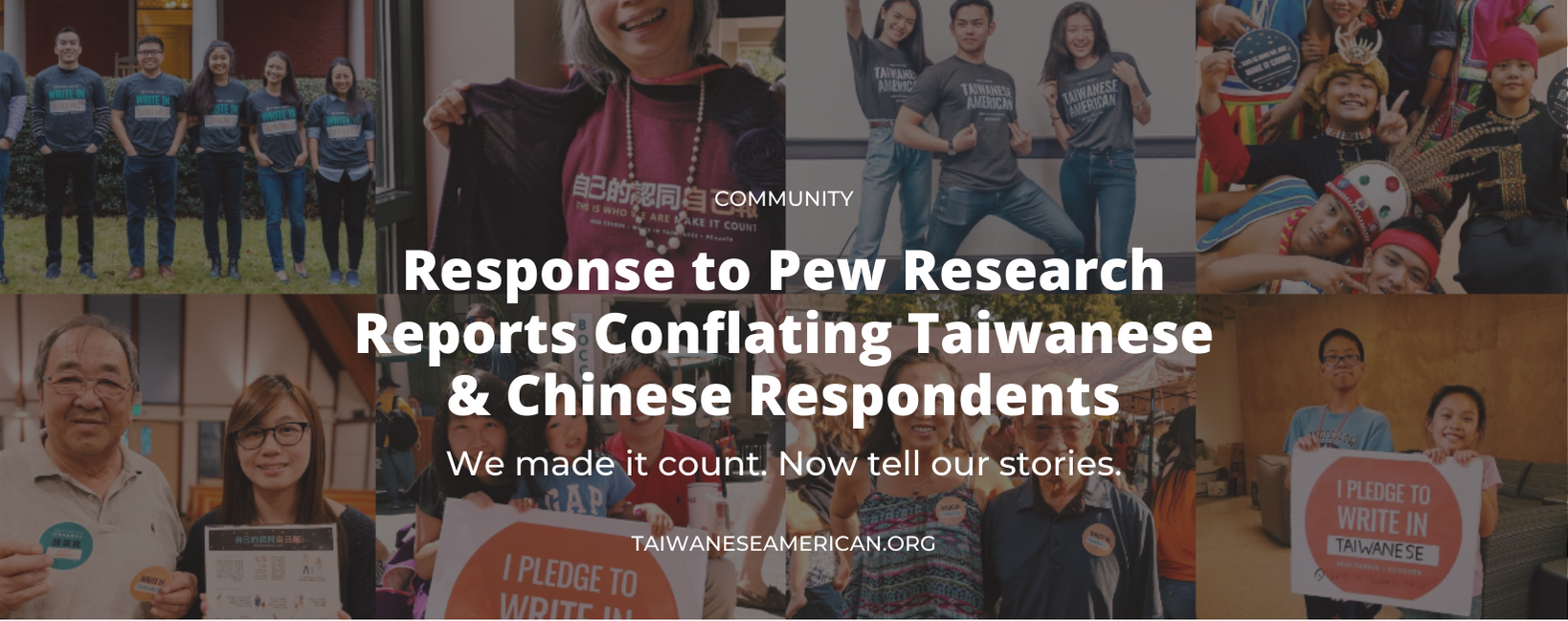by Brian Hioe
語言:
English
Photo Credit: Screenshot
A RECENT REPORT released by the Pew Research Center aimed at investigating Asian American diversity has provoked outrage, because of the fact that the report included Taiwanese Americans under the category of Chinese Americans. That is, the report did not have any separate category for Taiwanese Americans, but instead aggregated data for Taiwanese Americans and Chinese Americans as one category.
In reaction to the report, TaiwaneseAmerican.org released an open letter, criticizing the Pew Research Center’s actions as a form of erasure, seeing as China is engaged in a constant process of issuing geopolitical threats against Taiwan, and trying to push the international world to view Taiwan as part of China through political and economic coercion. The open letter also noted that the Pew Research Center does not group other identities together, such as grouping Nepalese data with Indian data or Hmong data with Laotian data, but seemed willing to do so for Taiwanese and Chinese. As such, the organization demanded an apology and explanation from the polling center for its actions, and that the data be re-released in disaggregated form.
 The open letter in question
The open letter in question
For its part, the Pew Research Center later responded to backlash by claiming that it relied on self-identification for research purposes, and that, in past polls, 62% of Taiwanese Americans would still fill in their race as “Chinese”. As such, the Pew Research Center claimed that, “Because it is difficult to directly identify Taiwanese Americans confidently and distinctively with the data from the Census Bureau we use in this research, we group people choosing Taiwanese race as part of the larger Chinese American population.”
Indeed, as the majority of Taiwanese are of Han descent, it should not be surprising that individuals of Taiwanese descent might choose “Chinese” as a racial category. However, despite this obvious fact, individuals of Taiwanese descent might not self-identify as Chinese. Consequently, the Pew Research Center’s explanation is not only illogical, but one which fails to grasp the basic fact that national identity is not the same as racial identity. One expects a poll on diversity to know at least this.
In this sense, the Pew Research Center essentializes “Chinese” as a form of identity and racial category. Doing so opens up the door to further forms of erasure—one notes that in contemporary China, ethnic Uyghurs, Tibetans, and other “ethnic minority” groups are sometimes claimed to be “Chinese” in the sense of not only being Chinese nationals. Rather, ethnic minority groups are posed as also as being “Chinese” by virtue of being part of Chinese civilization (中華文化), and sharing in Chinese culture (中華文化)—in that sense, they are framed as part of a Chinese people (中華人民) defined in cultural terms rather than racial background.
This inchoate and abstract notion of Chineseness proves useful for the CCP in advancing its geopolitical agenda; one notes that the CCP has been known to establish overseas front groups aimed at suggesting that Tibetans are, in fact, Chinese in order to promote this narrative as part of overseas United Front efforts. Assimilation efforts by the CCP are aimed at stamping out independent forms of identity, inclusive of the current imprisonment of over one million Uyghurs in “reeducation camps”, or the decades-long effort by the CCP to stamp out Tibetan Buddhism.
The Pew Research Center is suggesting that it has no issue with this fact. Apart from moral culpability, one notes that this will not produce very accurate data. Indeed, from a methodological standpoint, the Pew Research Center could have simply indicated that it has a small sample size of Taiwanese Americans, rather than try to include them under the category of Chinese Americans. Effectively, the Pew Research Center enshrines the nationalist abstractions that the CCP is attempting to promote with its actions, and gives further ground to efforts by the CCP to claim the whole of the Chinese diaspora, including individuals of non-Han descent.
Presenting data on Taiwanese Americans is not a straightforward task, and it is one that underscores the need for better data to understand #AAPI communities. Our latest research on Asian Americans provides an example of why this is true. (Thread) https://t.co/exLqeUJfbl
— Pew Research Center (@pewresearch) May 5, 2021
Response by the Pew Research Center in a Tweet
And, of course, as should go without saying, it seems rather absurd for the Pew Research Center to claim that it primarily relies on self-identification for its research, but then to try and deny Taiwanese self-identification. Controversy regarding the Pew Research Center’s report takes place after years of campaigning by Taiwanese Americans to have a separate category on the US Census, in order so that Taiwanese Americans are not erased in assessments of the overall US population—as such, this is why the Pew Research Center’s report has been seen as something of a slap in the face.
Ironically enough, the Pew Research Center released results of polling in Taiwan on Taiwanese national identity last May, in a highly publicized set of survey results—finding that 66% of the national population view themselves as Taiwanese, 28% as both Taiwanese and Chinese and 4% as just Chinese. This does not seem to have been taken into account by Pew’s US-based polling, however. One expects efforts to push for change to be an uphill effort.

